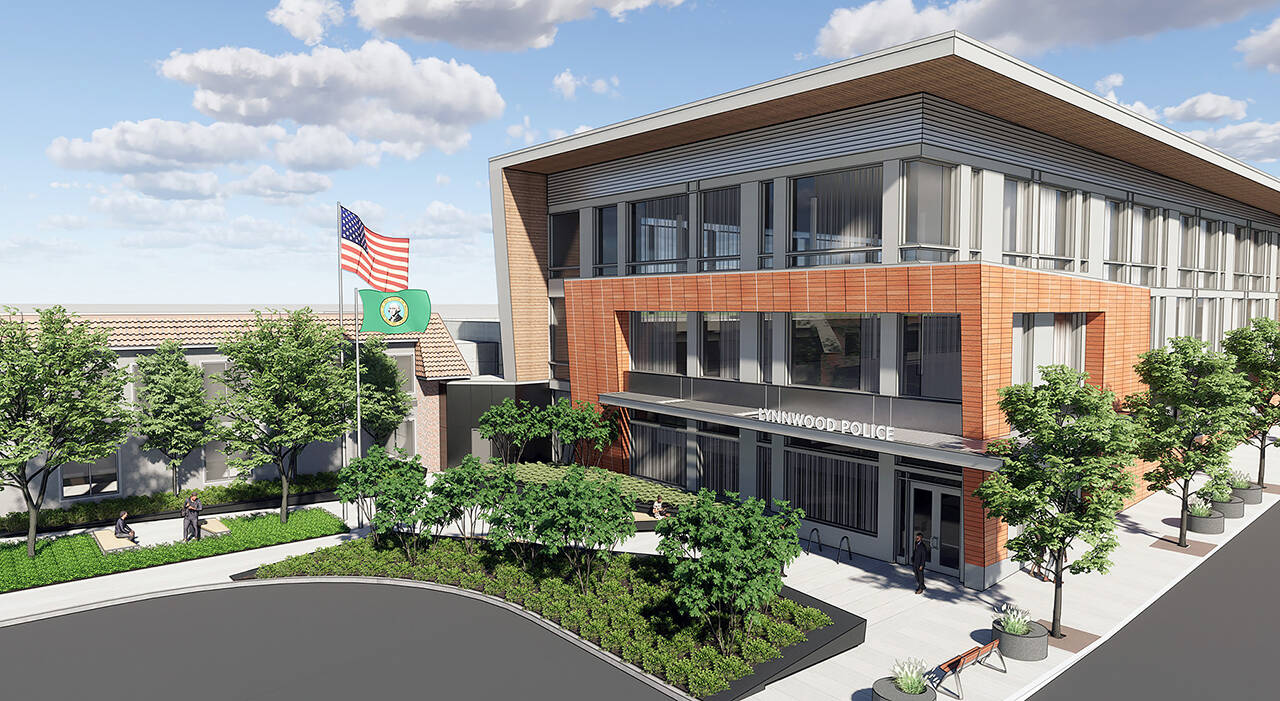LYNNWOOD — A new Community Recovery Center will be a “game-changer for us in law enforcement” as an alternative to jail, Lynnwood Police Chief Jim Nelson said.
He was referring to the mental health wing of the city’s Community Justice Center currently under construction in the 19300 block of 44th Avenue W. The justice center also will house the police department, misdemeanor court and a new jail.
The city recently hosted a virtual open house to answer questions about the Community Recovery Center.
Here are a few questions you may have.
How was it developed?
The Community Justice Center had been in the works for years as city officials said there was a need for updated facilities. But just as the City Council was set to move forward, the death of a woman in the existing jail drew public outcry.
Tirhas Tesfatsion’s family and supporters led a crowd into City Hall in late July 2021, arguing her death by suicide showed Lynnwood shouldn’t build a new jail. A Kirkland police investigation found Tesfatsion, 47, was left alone for three hours before killing herself. Lynnwood police policy requires safety checks at least every 60 minutes.
The city agreed to rethink the center, putting together a task force led by the police chief and Rep. Lauren Davis, D-Shoreline. What they came up with was the Community Recovery Center dedicated to residents in crisis. They reallocated about 5,000 square feet from the original proposals and added two floors. The space will total 15,000 square feet, Moore said.
Davis said she has never seen a behavioral health project get developed this quick.
With the recovery center’s addition, the proposed size of the new jail was reduced from 120 beds to 80-something. The old jail had 46 beds.
Who will it serve?
The facility will have 15 or 16 recliners in an observational unit where adults in crisis can stay for 23 hours. Nelson called it a “living room model.”
“You’re not going to see plexiglass,” said Jamie Sellar, of the facility’s planned operator Recovery Innovations International. “You’re not going to see an institutionalized setting. … It’s really going to be built as a conduit to go ahead and support folks who are in a behavioral health or substance use disorder crisis.”
When they’ve stabilized, they may be released back to the community. In the provider’s other facilities, about 70% get released after 23 hours, Sellar said.
If people need to stay longer, there is short-term residential care with 16 beds on the floor above. Sellar anticipates those people would stay about 3½ days.
Davis compared the space to the behavioral health urgent care center opened at Providence Regional Medical Center Everett in 2019. She hopes this facility will serve communities across south Snohomish County.
People can go there on their own or family members can bring them. Law enforcement can also refer folks.
This could also be a space to bring people who call the upcoming 988 behavioral health crisis line, said Davis, the state representative.
Sellar said the only barrier to entry will be age. Anyone 18 and over can use the services.
How is it funded?
The total budget is about $17 million for the project, Nelson said, with $3 million of that coming from the county.
Another $12 million was included last week in a state Senate proposed capital budget. It may take a couple years to get that money, Davis noted.
The city is also looking to get a grant for just under $2 million.
When will it open?
Like the Community Justice Center, it is expected to open in October 2023.
Who will run the facility?
Recovery Innovations, a service provider operating around the world, will be at the helm. It also operates facilities in Pierce County.
In a recent city council meeting, Nelson called the provider the “gold standard of crisis stabilization.”
Who will work there?
The issue of staffing in mental health spaces is an ongoing one both statewide and nationally.
However, Sellar said that won’t be much of an issue in Lynnwood. The operator plans to have telehealth options. And over a quarter of the onsite staff will likely have either gone through mental health or substance use challenges, or have a family member who has.
“What we tend to find is that when you utilize a lot of lived experience within your programs that hope becomes much easier to access to the folks that we serve,” he said. “They are the embodiment that recovery is possible.”
Jake Goldstein-Street: 425-339-3439; jake.goldstein-street@heraldnet.com. Twitter: @GoldsteinStreet.
Talk to us
> Give us your news tips.
> Send us a letter to the editor.
> More Herald contact information.

























